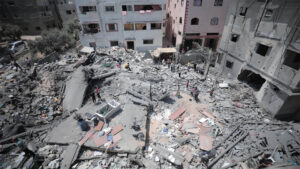With the Iranians eyeing nukes, why haven’t regional powers like the Israelis stepped in and squashed those dreams?
Targeting Iran’s nuclear capabilities isn’t so straightforward. Plutonium is a byproduct of civilian nuclear reactors (and they’re not going to target those), uranium is abundant and can be sourced fairly easily, and uranium enrichment centrifuges can be easily moved…so, targeting their nuclear infrastructure is impractical.
Israel has opted to disrupt Iran’s nuclear hopes in other ways. They eliminate key experts via assassination programs, launch cyberattacks and keep tactical airstrikes in their back pocket. And given Iran’s declining industrial capabilities, this nuclear program serves more as a bargaining chip than a serious attempt at weaponization.
Should Iran fly a little too close to the sun and get a nuke within arm’s reach, you should expect Israel and Saudi Arabia to quickly put them in their place.
Here at Zeihan on Geopolitics, our chosen charity partner is MedShare. They provide emergency medical services to communities in need, with a very heavy emphasis on locations facing acute crises. Medshare operates right in the thick of it, so we can be sure that every cent of our donation is not simply going directly to where help is needed most, but our donations serve as a force multiplier for a system already in existence.
For those who would like to donate directly to MedShare or to learn more about their efforts, you can click this link.
Transcript
Hey everybody. Peter Zeihan here. Coming to you from three sisters in Taranaki, New Zealand. And today we’re taking a question from the Patreon family. Specifically why Israel hasn’t struck at Iranian nuclear facilities in an attempt to prevent the Iranians from ever developing a bomb in the first place. And there’s a number of reasons for this. But the core issue is this.
And there’s too much to go after to do it reliably. So let’s go through the materials of what you need to to make a meaningful bomb. First of all, you need the raw materials, either uranium or plutonium. Now, any civilian nuclear power reactor is going to generate a lot of plutonium as a byproduct. So we’ve got about a one gigawatt, power plant, which for a nuclear power plant is pretty much a run of the mill.
You’re going to generate enough waste plutonium every year to make about a dozen plutonium bombs. So unless you’re going to take out the nuclear facilities, you’re not going to be able to remove that from their supply chain. And, bombing a civilian nuclear power plant obviously comes with a few consequences. As for uranium, uranium is one of the most common materials on Earth.
And so it’s very easy to source. In the early Cold War days, when we thought it was rare, we, the United States, cut a deal with the Australians who at the time had most of the global production, basically cornered the market. But since then, it’s been discovered in all kinds of places. And the world’s largest producers are Canada, Australia, Kazakhstan, Russia and China.
So, you know, removing those countries from the mix. Yeah, I’m not going to happen. Even if you did. Ultimately, you only need a few tonnes of the ore to generate the yellowcake that you need, in order to generate the finished metal that you need for lutetium. So going after the raw materials really isn’t a play. Moving up the value added scale, however, you get some more options because, you know, these raw materials don’t do anything, by themselves.
You need the system that’s necessary to purify and extract the plutonium from the waste material and then purified in the metal. There are a lot of chemicals you can go after there. But again, most of those are globally available under the civilian supply chain. So it’s a limited on the uranium front.
If you have your raw uranium ore, you basically have to mix it with chlorine gas to make a material that you can then run through a centrifuge over and over and over and over to extract the specific type of uranium that is fissile, that can go into a bomb. Those centrifuges are definitely a weak point in the process that is restricted technology.
And in order to have a weapons program of size, you also need a lot of them. Now, the problem here is it doesn’t matter where those things are. You could have a cluster of a few thousand in one place. You could disperse it. And whenever people talk about striking Iran’s weapons systems, the Iranians just move the centrifuges around because they can be easily individually loaded into trucks and move wherever they want.
So, you know, you do a single round of airstrikes, you might get some of them. You’re certainly not going to get all of them. And you only need so much of this stuff in order to make a bomb. Then you’ve got the the metallurgy. There are different types of weapons systems, that use plutonium and uranium, and there’s different ways that you can combine them to make an explosive product.
But this is an engineering question. And ultimately, this is where the Israelis have chosen to focus. Can’t go after the raw materials. You can’t go after the equipment. You go after the people with the experience of how to turn these processed materials into something that can go boom. And so Israel focuses on what it does well. Instead of surgical strikes, they have an assassination program.
And whenever an Iranian nuclear scientist starts to get a little bit too productive, he tends to, fall down some stairs after getting shot in the back of the head with some bullets. So it’s not that the Israelis aren’t doing anything to contain this threat, it’s that they’re striking the weak point in the system, which is the personnel.
One of the wild things about Iran is that their industrial base today is significantly less sophisticated than it was back in 1980. This is a country that has been in long term industrial decline for any number of reasons, sanctions of which are only one part of it. And that means the Israelis have found it actually pretty easy to pick off individual people who are involved in the weapon system in order to snarl the whole system.
Now, that doesn’t mean that’s the only thing they do. They also engage in a degree of sabotage and cyber hacks. And if push came to shove, I have no doubt that they’re willing to do tactical airstrikes. But you’re talking about something that can be dispersed. You’re talking about something that once you do start going after it, the, receiving country, Iran in this case, has a vested interest in keeping the system as dispersed as possible and then accelerating the work.
So until now, the Iranian nuclear program has mostly been a negotiating chip that they are willing to trade away in exchange for a broader deal specifically with the United States. And that’s one of the reasons why this technology, which was developed in the 40s, still hasn’t been replicated in the Persian Gulf. There’s also a strategic side to this.
Israel is already a nuclear power. And if the Israelis ever really did feel that the Iranians were getting close, they’d probably use their own systems to make sure that Iran could never cross the threshold and they’d do a preemptive nuclear strike. The other side of the strategic question is Iran is not alone in the neighborhood. Closer to home.
Just across the Persian Gulf are the Saudis and the Saudis and the Iranians don’t care for each other very much. And the big difference between these two is that Saudi Arabia has much deeper pockets. So if Push ever did really come to shove, and it did look like Iran was going to develop a functional weapon, not only would they be risking a preemptive Israeli nuclear strike, but the Saudis would probably just go out, write a check, and buy some nukes from another country, most notably Pakistan.
So for Iran, the nuclear card is not nearly as valuable as most people seem to think it is, because they know if they even try to draw it from the deck, they’re gonna get hammered real hard. So this is something I worry about. Not really. And whenever there’s something in the Middle East that I don’t worry about, I call that a win.








